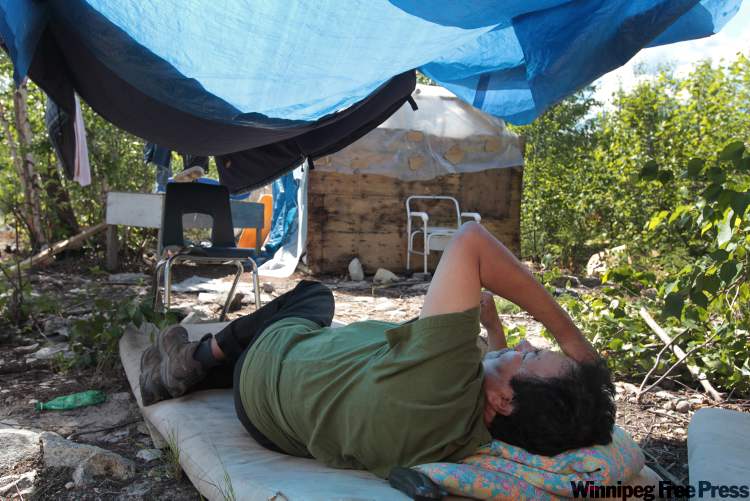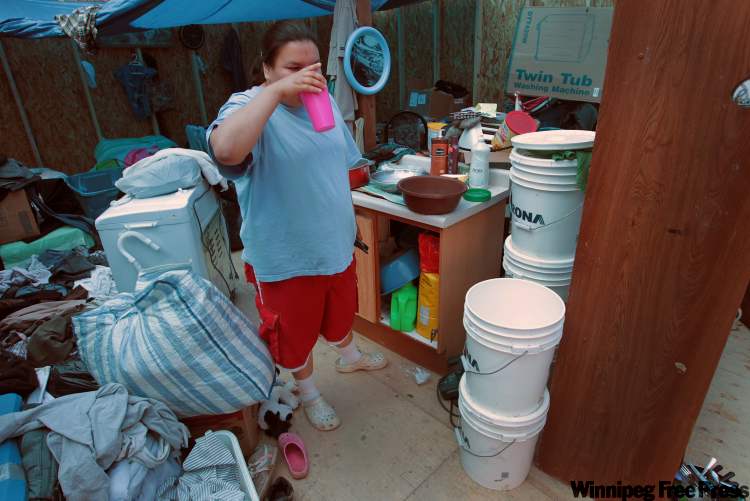Superbugs rampant in homes without plumbing
Advertisement
Read this article for free:
or
Already have an account? Log in here »
To continue reading, please subscribe:
Monthly Digital Subscription
$19 $0 for the first 4 weeks*
- Enjoy unlimited reading on winnipegfreepress.com
- Read the E-Edition, our digital replica newspaper
- Access News Break, our award-winning app
- Play interactive puzzles
*No charge for 4 weeks then billed as $19 every four weeks (new subscribers and qualified returning subscribers only). Cancel anytime.
Read unlimited articles for free today:
or
Already have an account? Log in here »
Hey there, time traveller!
This article was published 29/10/2010 (5130 days ago), so information in it may no longer be current.
ST. THERESA POINT — A doctor first “prescribed” running water for Bernard Flett more than 10 years ago.
In 2007, another doctor from Winnipeg’s Health Sciences Centre took out his prescription pad and wrote to the band council: “The patient requires heat and running water in his home to care for his diabetic foot. Please arrange this to improve Mr. Flett’s health.”
Flett, 57, has already had the toes on one foot amputated and struggles with a persistent infection treated with powerful antibiotics because his body is colonized with the MRSA superbug.

Earlier this year, he had a hard, painful boil on his thigh that had to be drained.
Eight people live in Flett’s home, including his 11-year-old grand-daughter, who has also picked up the superbug known for causing nasty boils. It’s easy to spread in homes without flush toilets or enough water to wash bodies and clothes.
The family has an old-fashioned twin-tub washing machine into which they pour water by hand. “When they wash clothes, they use up the water fast,” Flett said of his wife and daughters. If the family runs short of water, laundry is usually the first thing neglected, he said.
Kiara Peyuk, 7, pulls out of the porch a red plastic tub the kids use for baths.
“We try to keep the kids clean,” her grandpa said.
His daughter Irafrana Flett said it was hardest when her kids were in diapers. When the plastic garbage pail the family uses for water storage needs filling — usually twice a day — she grabs a plastic sled to pull over the snow to the nearest outdoor water tap.
Because Flett can barely walk to the outhouse, he often goes to the bathroom in an indoor pail. So do his grandchildren, especially in winter.
“We use a garbage bag and we throw it out over the rock. It’s the only thing we can do,” he said.
Flett had to fly to Winnipeg in June to meet with medical specialists. It’s trying, staying at a rundown Winnipeg motel with drunken patrons fighting in the next room, but at least there’s running water to help keep his infected foot clean.
Dr. Hanka Hulsbosch, who works in nearby Garden Hill, said people with diabetes typically have weakened immune systems and poor circulation, which makes them vulnerable to methicillin-resistant Staphylococcus aureus.
“Most of the adults I see with MRSA have diabetes. Lots of kids have MRSA, but it is being passed back and forth between adults and kids, and with diabetes rampant in the north, the MRSA flourishes.”
Sometimes MRSA can go deeper into the body, invading the heart, lungs, blood or bone. In 2007, a four-year-old Nunavut boy died from MRSA after being flown to Churchill.
The superbug seems to be taking off in First Nations in the region which includes Island Lake, the number of positive tests almost doubling in the last two years. Health Canada has not investigated whether the incidence is higher in communities that lack running water, but a 2008 Alaska study found MRSA rates were three times higher in villages where less than 80 per cent of homes had running water.
This summer, Flett’s house was finally renovated, but his community is so overcrowded that there was nowhere to live while construction workers installed a water holding tank, flush toilet, plumbing and a furnace. The whole family — and their furniture — crowded inside a makeshift wooden frame covered with tarps for a couple of months.
“Finally, I’m getting (running water),” Flett said wearily, as he lay outside on a mattress because the July heat in the unventilated tent was unbearable.

Coun. Martin Monias said the First Nation gets lots of letters from doctors about local residents who need running water in their homes.
He notes that the doctors often work for the federal government, which is slow to provide funding desperately needed to improve reserve housing. “We always ask them, ‘Why don’t you add in a cheque?'”
helen.fallding@freepress.mb.ca
Number of positive MRSA test results, July 1 to June 30
First Nations in Burntwood region rest of Manitoba
2007-8 743 1,461
2009-10 1,426 1,741
Increase 92% 19%
Source: Manitoba Health monthly communicable disease reports.


